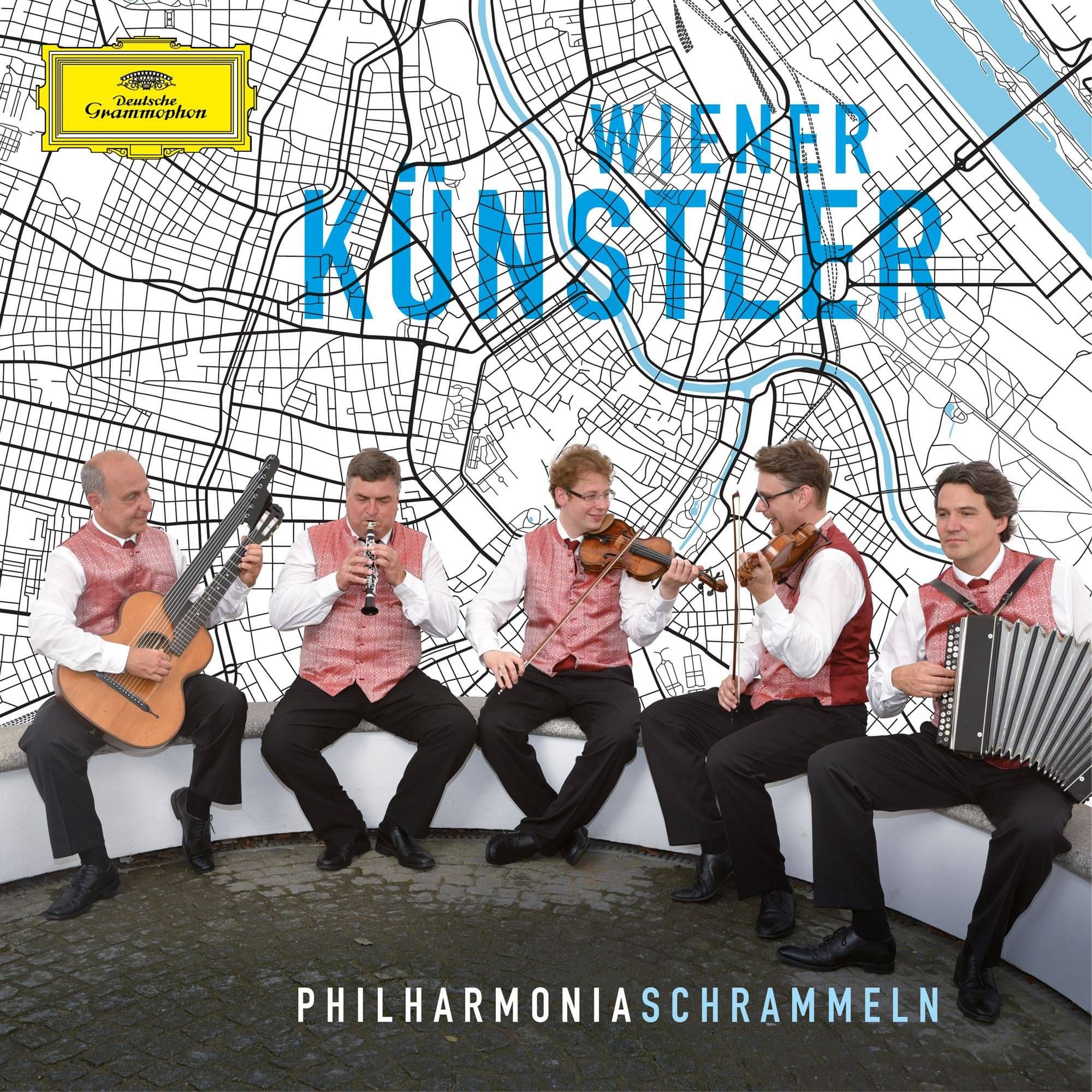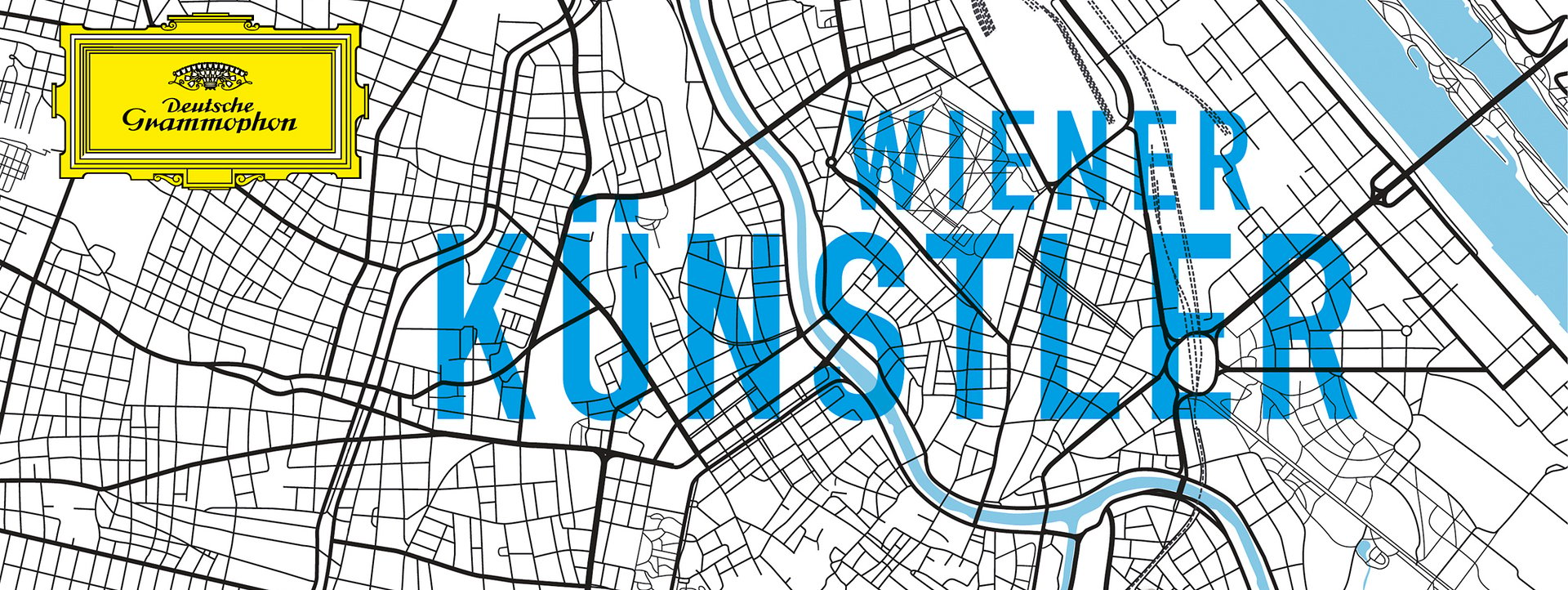
Wiener Künstler, Philharmonia Schrammeln
Komponisten:
Schrammel /Thirsfeld, Fahrbach / Mikulas, Eduard Strauß/Egger, Drescher / Mikulas, Katzenberger / Wasservogel, Mikulas, Mayer, Schrammel / Wasservogel, J. Strauss II/Götz, Schrammel / Egger, Richard Wagner/ Anonymus, J. Strauss I/Egger, Zajicek / Peter
Interpreten:
Johannes Tomböck, an der Ersten Geige
Dominik Hellsberg, an der Zweite Geige
Günter Haumer, Knopfharmonika
Heinz Hromada, Kontragitarre.
Hannes Moser, G-Klarinette "picksüße Hölzl"
Label: Deutsche Grammophon, Release Date: 2016
Preis: über externen download
Music information to the wine
The fact that this CD opens with the March "Wiener Künstler" (Viennese Artists) underscores the Schrammel Quartet's connection with the Vienna Philharmonic. For the 100th Philharmonic concert in 1886, conductor Hans Richter invited the Schrammel brothers to play before the orchestra, and Johann (Hanns) Schrammel expressed his gratitude by composing the March "Wiener Künstler" (Viennese Artists). Reportedly, Johann Strauss was "not amused" by Lanner's preferential treatment. The present version was arranged by Otto Thirsfeld.
The Polka française "Im Kahlenbergerdörfl" (Im Kahlenbergerdörfl) was composed by Philipp Fahrbach Jr. The young Fahrbach took over his father's orchestra, which had begun with Johann Strauss Sr., and performed at, among other venues, the 1873 World Exhibition in Vienna. He was one of Vienna's most popular dance composers of his time. The arrangement for Schrammel Quartet was made by the virtuoso harmonica player Josef Friedrich Mikulas, who this time favored the "sweet wood." In his long musical career, which lasted until 1980, he not only arranged but also composed countless works of his own.
The D-Tanz is by Johann Schrammel. In this original piece, the arrangement is unnecessary. The fine compositional technique speaks for itself.
The Polka schnell Wien über alles by Eduard Strauss was arranged by Alfons Egger for the Schrammel Quartet. These loving arrangements allowed the Philharmonia Schrammel to incorporate a large part of the Strauss brothers' oeuvre into their repertoire. In doing so, he greatly expanded the ensemble's range.
The waltz Dichterworte (Poet's Words) by Johann Schrammel is heard again in its original form. It becomes clear that the Schrammel Quartet also play the specifically Viennese waltz time, even though they themselves probably never played for dancing. For a Viennese who can dance the waltz, the question of the length of the individual quarter notes poses no problem. The 180-degree turn simply takes more time than the final foot movement in the last measure.
Carl Wilhelm Drescher (1850–1925) also played in the Schrammel Quartet. With his own orchestra, he achieved great popularity as the "King of Viennese Salon Orchestras." His Grinzinger March pays homage to Vienna's most famous wine tavern district. Josef Mikulas arranged it for clarinet.
Josef Mikulas again arranged Johann Schrammel's waltz idyll "Morning Greetings" for harmonica. It couldn't be more Viennese. Like many waltzes, this one isn't intended for dancing. It's about absolute music, instrumental performance pieces.
Alexander Katzenberger (1831–1892) is distinguished by his particular originality. Together with his wife, who played the "sweet little wood" excellently, and his children, he built a small salon orchestra that performed primarily in Vienna's Prater. The dance "Memories of the Red Barn" was arranged by composer Walter Wasservogel (1912–1986), who performed for decades in a bar in Vienna's city center.
In "Galloping at the Fasslrutsch'n," Karl Mikulas addresses the custom of sliding over a thousand-bucket barrel on St. Leopold's Day on November 15th in Klosterneuburg. Josef Mikulas' brother was also a brilliant communicator of Viennese dance tunes.
"A Schnoferl ziagn" is the Viennese expression for wrinkling one's nose to indicate being upset or offended. "Schnoflert" means "speaking through the nose." Composer Johann Mayer, nicknamed Zwickerl, added precise playing instructions for the Schnofler Dance: "sul ponticello," near the bridge, to create a nasal tone.
Johann Schrammel's polka française "Praterveigerln" (Prater Violets) refers to the search for the first violets in the Prater. Those who found these first signs of the approaching spring could be proud. Arranged for clarinet by Walter Wasservogel.
When an assassination attempt on Emperor Franz Josef I failed on February 18, 1853, Johann Strauss wrote a march with the complicated title: Kaiser Franz Josef I. Rettungs-Jubel-Marsch (Emperor Franz Josef I. Rescue-Jubel-Marsch), which concluded with an echo of Haydn's old hymn. Eberhard Götz, a former member of the ensemble, adapted the march for the Schrammeln ensemble. Vienna owes the construction of the Votive Church to this rescue.
Alfons Egger arranged Johann Schrammel's Old Viennese Singing Dances. Egger, a member of the State Opera Orchestra since 1967, became first violinist with the Schrammeln Philharmonic in 1972 and rose to prominence as a recognized expert on Viennese music. The Schrammel brothers were particularly dear to his heart, which is why he collaborated on his mother Margarethe Egger's book Die Schrammeln und ihre Zeit (The Schrammel Brothers and Their Time), which is considered a definitive work on these quintessential Viennese musicians and the genre they created. In 1997, he crowned his commitment to the previously underrated composer Josef Lanner by founding the orchestra "Corso Wien." To this day, he continues to influence the Schrammel Philharmonic.
In May 1861, Richard Wagner heard his Lohengrin for the first time in Vienna and was enraptured by the performance. It therefore makes sense to demonstrate that the prelude to this opera loses none of its impact even in the Schrammel ensemble with button accordion, and that one can even hear new facets.
Alfons Egger arranged Johann Strauss Sr.'s Chinese Galop for clarinet. If you listen closely, you might notice that a quote from Puccini's Turandot has been swindled into the mix. Egger's sense of humor isn't limited to his arranging. He remains the heir of Josef Lanner, who developed and cultivated the humorous element in Viennese music early on.
In the 20th century, Hans Zajicek (1899–1973) continued the Viennese tradition and composed the Vorstadt-Tanz (Suburban Dance). The arrangement was by Robert Peter.
The final piece, again by Carl Wilhelm Drescher, is the joke polka "Keller zahl'n" (Waiter Pays), which concludes the piece with a study in refined Viennese humor, arranged by Josef Mikulas.
© Richard Schmitz
the following wine was sonicated with this music...
Wiener gemischter Satz, 2019
Wiener Künstler, Philharmonia Schrammeln
Artists: Philharmonia Schrammeln
Johannes Tomböck, Dominik Hellsberg, Günter Haumer, Heinz Hromada, Hannes Moser
Wine maker: Weingut Wien - Cobenzl
Origin: Austria, Vienna, Grinzing
Alcohol: 12,5 %

